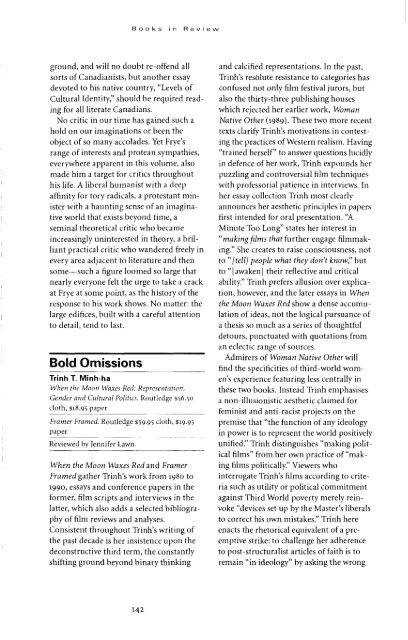The Carpathians - University of British Columbia
The Carpathians - University of British Columbia
The Carpathians - University of British Columbia
You also want an ePaper? Increase the reach of your titles
YUMPU automatically turns print PDFs into web optimized ePapers that Google loves.
ground, and will no doubt re-<strong>of</strong>fend all<br />
sorts <strong>of</strong> Canadianists, but another essay<br />
devoted to his native country, "Levels <strong>of</strong><br />
Cultural Identity," should be required reading<br />
for all literate Canadians.<br />
No critic in our time has gained such a<br />
hold on our imaginations or been the<br />
object <strong>of</strong> so many accolades. Yet Frye's<br />
range <strong>of</strong> interests and protean sympathies,<br />
everywhere apparent in this volume, also<br />
made him a target for critics throughout<br />
his life. A liberal humanist with a deep<br />
affinity for tory radicals, a protestant minister<br />
with a haunting sense <strong>of</strong> an imaginative<br />
world that exists beyond time, a<br />
seminal theoretical critic who became<br />
increasingly uninterested in theory, a brilliant<br />
practical critic who wandered freely in<br />
every area adjacent to literature and then<br />
some—such a figure loomed so large that<br />
nearly everyone felt the urge to take a crack<br />
at Frye at some point, as the history <strong>of</strong> the<br />
response to his work shows. No matter: the<br />
large edifices, built with a careful attention<br />
to detail, tend to last.<br />
Bold Omissions<br />
Trinh T. Minh-ha<br />
When the Moon Waxes Red: Representation,<br />
Gender and Cultural Politics. Routledge $56.50<br />
cloth, $18.95 paper<br />
Framer Framed. Routledge $59.95 cloth, $19.95<br />
paper<br />
Reviewed by Jennifer Lawn<br />
When the Moon Waxes Red and Framer<br />
Framed gather Trinh's work from 1980 to<br />
1990, essays and conference papers in the<br />
former, film scripts and interviews in the<br />
latter, which also adds a selected bibliography<br />
<strong>of</strong> film reviews and analyses.<br />
Consistent throughout Trinh's writing <strong>of</strong><br />
the past decade is her insistence upon the<br />
deconstructive third term, the constantly<br />
shifting ground beyond binary thinking<br />
and calcified representations. In the past,<br />
Trinh's resolute resistance to categories has<br />
confused not only film festival jurors, but<br />
also the thirty-three publishing houses<br />
which rejected her earlier work, Woman<br />
Native Other (1989). <strong>The</strong>se two more recent<br />
texts clarify Trinh's motivations in contesting<br />
the practices <strong>of</strong> Western realism. Having<br />
"trained herself" to answer questions lucidly<br />
in defence <strong>of</strong> her work, Trinh expounds her<br />
puzzling and controversial film techniques<br />
with pr<strong>of</strong>essorial patience in interviews. In<br />
her essay collection Trinh most clearly<br />
announces her aesthetic principles in papers<br />
first intended for oral presentation. "A<br />
Minute Too Long" states her interest in<br />
"makingfilms that further engage filmmaking."<br />
She creates to raise consciousness, not<br />
to "[tell] people what they don't know" but<br />
to "[awaken] their reflective and critical<br />
ability." Trinh prefers allusion over explication,<br />
however, and the later essays in When<br />
the Moon Waxes Red show a dense accumulation<br />
<strong>of</strong> ideas, not the logical pursuance <strong>of</strong><br />
a thesis so much as a series <strong>of</strong> thoughtful<br />
detours, punctuated with quotations from<br />
an eclectic range <strong>of</strong> sources.<br />
Admirers <strong>of</strong> Woman Native Other will<br />
find the specificities <strong>of</strong> third-world women's<br />
experience featuring less centrally in<br />
these two books. Instead Trinh emphasises<br />
a non-illusionistic aesthetic claimed for<br />
feminist and anti-racist projects on the<br />
premise that "the function <strong>of</strong> any ideology<br />
in power is to represent the world positively<br />
unified." Trinh distinguishes "making political<br />
films" from her own practice <strong>of</strong> "making<br />
films politically." Viewers who<br />
interrogate Trinh's films according to criteria<br />
such as utility or political commitment<br />
against Third World poverty merely reinvoke<br />
"devices set up by the Master's liberals<br />
to correct his own mistakes." Trinh here<br />
enacts the rhetorical equivalent <strong>of</strong> a preemptive<br />
strike: to challenge her adherence<br />
to post-structuralist articles <strong>of</strong> faith is to<br />
remain "in ideology" by asking the wrong

















